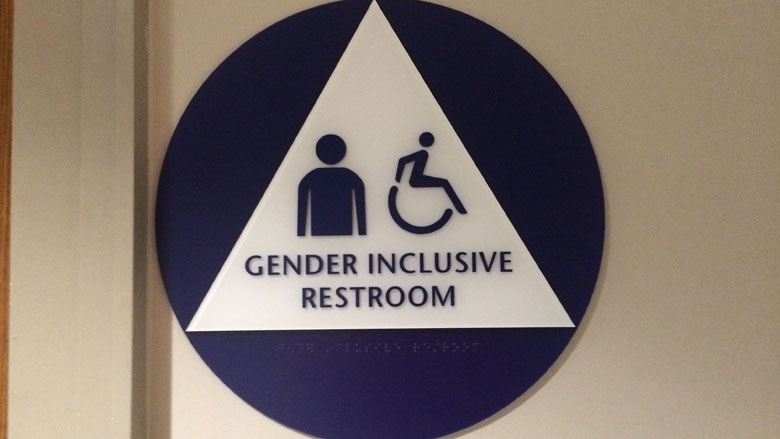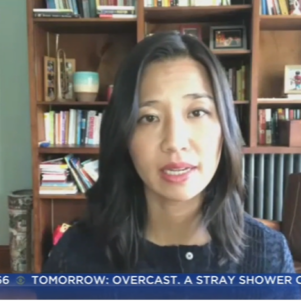‘Bathroom bill’ moot, if federal officials have their way
By Evan Lips | March 15, 2016, 13:18 EDT
 A bathroom sign reflects changing times. (NewBostonPost photo by Kara Bettis)
A bathroom sign reflects changing times. (NewBostonPost photo by Kara Bettis) BOSTON — The federal government may soon require Massachusetts public schools to allow transgender students to use the bathroom of their choice, regardless of whether the state legislature passes the so-called “bathroom bill,” an examination of U.S. Department of Education documents indicates.
Massachusetts is currently considering legislation that would give transgendered people the right to use the bathroom or locker room that corresponds to their gender identity, rather than their anatomical sex. But officials at the U.S. Department of Education say that Title IX of the Education Amendments of 1972 already mandates that result in schools that receive federal funding.
No discrimination on the basis of sex
Title IX outlaws discrimination “on the basis of sex” in educational programs or activities that receive federal financial assistance. The law applies to all aspects of educational programming, from athletics to disciplinary codes. Although it forbids discrimination, it does not forbid sex segregation for privacy concerns and, therefore, allows schools to operate sex-segregated bathrooms and locker rooms.
When Title IX became law in the early 1970s, it was assumed that its language prohibited only discrimination on the basis of biological sex. But over the past several years, in little noted memos, letters, court filings, and settlement agreements, officials from the Obama administration have advanced an interpretation of Title IX that forbids discrimination not simply on the basis of biological sex, but also on the basis of gender identity.
On the fifth page of a 46-page interpretive memorandum, issued in 2014, lawyers from the Department of Education wrote that “Title IX’s sex discrimination prohibition extends to claims of discrimination based on gender identity or failure to conform to stereotypical notions of masculinity or femininity and [the Office for Civil Rights at the Education Department] accepts such complaints for investigation.”
Based on this interpretation, the Obama administration argues that students have a legal right to use sex-segregated facilities in accordance with their gender identity, and that federal law prohibits schools from requiring students to use the bathroom of their biologically-assigned sex.
Enforcing the new mandate
Last year, in a groundbreaking Title IX administrative action, the Obama administration ordered a suburban Chicago school district to allow a trans-female to change in the girls’ locker room, rather than being sent to a private facility down the hall. Officials from Palantine Township High School District 211 originally refused to comply with the order. But when threatened with loss of millions of dollars in federal funding, the school district agreed to allow the student to change in the girls locker room behind privacy curtains.
At least one federal court, however, has rejected the administration’s interpretation of the statute.
In July 2015, Judge Robert G. Doumar of the U.S. District Court for the Eastern District of Virginia denied a preliminary injunction that would have required Gloucester, Virginia, public schools to allow a student, who was born female, to use the boys’ restroom and locker room at the start of the school year. The Obama administration had filed a statement of interest in the case, siding with the student and citing its 2014 interpretation of the law.
“Under Title IX, discrimination based on a person’s gender identity, a person’s transgender status, or a person’s nonconformity to sex stereotypes constitutes discrimination based on sex,” Justice Department attorneys argued.
Doumar, however, disagreed and dismissed the Title IX claims, saying that federal law allows schools to separate restrooms based on sex.
Grimm is currently appealing Doumar’s decision.
South Dakota fights back; GOP governor relents
Last month, state lawmakers in South Dakota voted to reject the Obama administration’s interpretation of Title IX. The Mount Rushmore state was poised to become the first in the nation to pass a law requiring transgendered students to use school bathrooms and locker rooms according to their “chromosomes and anatomy” at birth until Gov. Dennis Daugaard vetoed the bill on March 1.
The Republican governor said he vetoed the bill in order to preserve local control by school boards. Daugaard also noted that the bill’s enactment would have led to costly courtroom battles.
So what about Massachusetts?
Bay State lawmakers, taking the opposite approach from their South Dakota counterparts, are currently considering legislation that would extend anti-discrimination protections to transgender people in public accommodations, including public locker rooms and restrooms.
In January, the bills (S 735/ H 1577) were referred to the Joint Committee on the Judiciary.
Last month, House Speaker Robert DeLeo said he started polling lawmakers in order to determine if the bill has enough support to withstand a potential veto from Gov. Charlie Baker, a Republican.
Baker has remained relatively quiet on the issue. In October he said he had some concerns over the proposal and stressed that he wants to focus more attention on the details before making any decision.
The bill was not taken up ahead of the Christmas recess, a development that Massachusetts Family Institute President Andrew Beckwith described as a “huge win” for the bill’s opponents. For the bill to land on Baker’s desk, a roll call vote must occur by July 31, after which he’ll have 10 days to review it.
Wednesday is the deadline for the Joint Committee to decide whether or not to issue a favorable report, although there is a possibility of an extension until May 2.
But, if Obama administration’s interpretation of federal law prevails, the point may be a moot one.
Federal vs. State law
So, does the Obama administration’s interpretation carry the day? Not according to former Department of Education attorney Hans Bader, now an analyst at the Competitive Enterprise Institute, a Washington, D.C.-based pro-limited government public policy institute.
Bader says that broad expansions of law, like the one at issue here, require an act of Congress or, at a minimum, need to go through the process of regulatory rule making, which requires that federal agencies allow a time period for public comment.
“The Education Department frequently makes up new legal mandates out of thin air under the bogus pretense that they are required by some statute, and then imposes them on colleges, without even going through the notice and comment required by the Administrative Procedure Act,” Bader wrote last September.
Without going through such processes, the Department of Education does not have legal authority to expand the scope of Title IX, or any other law, Bader notes.
But a footnote in the Department of Education’s April 2014 “Questions and Answers” memo leaves no doubt that the federal government considers its interpretation to be the law of the land:
“The Office for Civil Rights (OCR) issues this and other policy guidance to provide recipients with information to assist them in meeting their obligations, and to provide members of the public with information about their rights, under the civil rights laws and implementing regulations that we enforce,” notes a footnote on the first page. “OCR’s legal authority is based on those laws and regulations.”
Contact Evan Lips at [email protected] or on Twitter at @evanmlips.










